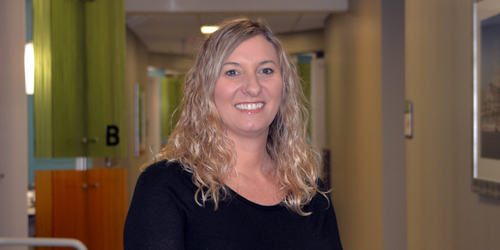
A nurse practitioner’s passion for improving patient outcomes could lead to a change in the way neurosurgical patients are treated. Jody Miniard, DNP, a nurse practitioner at Mayfield Brain & Spine and a finalist in the March of Dimes’ 2018 Ohio Nurse of the Year awards, has found that nurse practitioners can successfully triage spine patients to surgical or non-surgical treatment paths. Her research, published in the Journal of Neuroscience Nursing, suggests that nurse practitioners can help reduce wait times and improve outcomes not only in primary care practices but also in highly specialized practices such as neurosurgery.
“The biggest part of outcomes in my opinion — and what some of the literature shows — is patient access and patient satisfaction,” says Ms. Miniard. “It boils down to making sure patients get what they need in a timely and efficient manner.”
That can be a challenge in neurosurgical practices, which attract thousands of patients who have severe back or neck pain but can recover successfully without surgery. Patients may find themselves waiting for an appointment on a physician’s busy schedule, leading to reduced patient satisfaction and a delay in healing. If these patients are triaged quickly, Ms. Miniard says, surgical patients can be promptly scheduled to see a surgeon, and non-surgical patients can be referred to a physical therapist or a specialist who can provide a pain injection.
Ms. Miniard, who works in the spine practice of Robert Bohinski, MD, PhD, knew that patient triage by nurse practitioners has been used successfully in orthopedic practices, and she theorized that it would work in neurosurgical practices as well. At Mayfield, 70 to 80 percent of spine patients will not need surgery.
In Ms. Miniard’s study, she and co-investigator Kathleen Ballman, NP, reviewed 200 spine cases. The cases were also reviewed by a spine surgeon. The results showed that diagnoses by the nurse practitioners and physicians matched 100 percent of the time and that the nurse practitioners correctly referred patients for a surgical appointment more than 95 percent of the time.
Ms. Miniard has been sharing her study results in presentations around the United States, with the result that more spine patients may see a nurse practitioner or physician’s assistant rather than a neurosurgeon on their first visit to a neurosurgical practice
“Results of this study further the evidence that nurse practitioners are a valuable resource in facilitating timely access to neurosurgical care for spinal disorders,” Ms. Miniard writes in her publication.
Ms. Miniard is a finalist in the educator category of the Ohio Nurse of the Year Awards. Her Mayfield colleague, Neuro Nurse Specialist Dale Greene, RN, who works in the brain tumor practice of Ronald Warnick, MD, is a finalist in the ambulatory care category. The women will be honored at a celebration in Columbus in November.
Ms. Miniard — Miniard rhymes with vineyard – earned her bachelor’s degree in nursing at Indiana University in 2000. She began her nursing career in Cincinnati as a labor and delivery nurse, then took a position in an intensive care unit. After earning a master’s of nursing from the University of Cincinnati in 2004, she joined Mayfield. She became an adjunct clinical instructor at UC’s College of Nursing in 2015 and earned her doctorate in 2017. An assistant professor, she goes by Dr. Miniard in academic, but not clinical, settings.
Recalling the frenetic period between 2015 and 2017, Ms. Miniard says, “I worked full-time at the university and part-time at Mayfield. I have a family — two kids, three step-kids, a husband – and I went to school full-time. We might have eaten peanut butter and jelly a few nights a week, but I persevered.”
Today, Ms. Miniard holds a full-time faculty position while also working for Mayfield. The work, she says, “is something I love and something that interests me. So it doesn’t seem like work.”
She looks forward the day when nurse practitioners like herself play a critical role in triaging neurosurgical spine patients to their appropriate treatment path. “This is kind of like my baby,” she says. “I am a patient advocate first and foremost, and making sure that patients have timely access to care with knowledgeable and high-quality nurse practitioners is my passion.”
— Cindy Starr